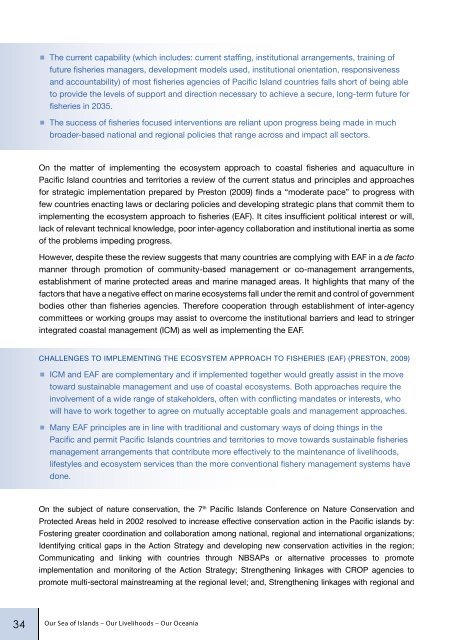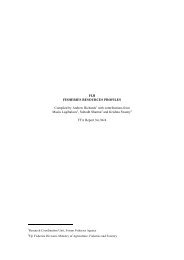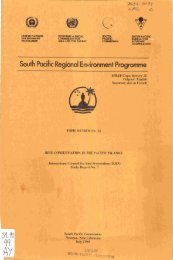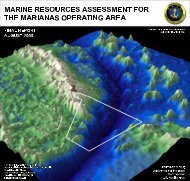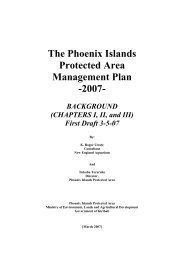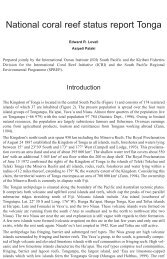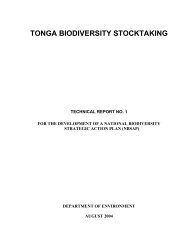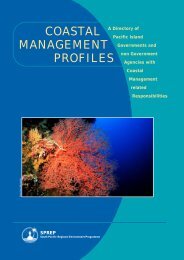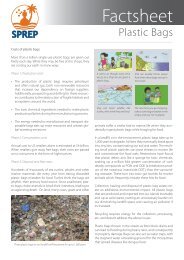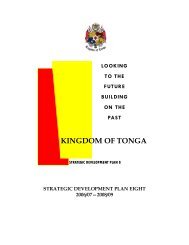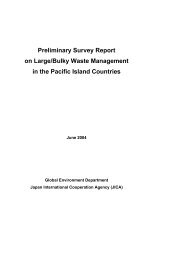Our Sea of Islands Our Livelihoods Our Oceania - SPREP
Our Sea of Islands Our Livelihoods Our Oceania - SPREP
Our Sea of Islands Our Livelihoods Our Oceania - SPREP
Create successful ePaper yourself
Turn your PDF publications into a flip-book with our unique Google optimized e-Paper software.
The current capability (which includes: current staffing, institutional arrangements, training <strong>of</strong><br />
future fisheries managers, development models used, institutional orientation, responsiveness<br />
and accountability) <strong>of</strong> most fisheries agencies <strong>of</strong> Pacific Island countries falls short <strong>of</strong> being able<br />
to provide the levels <strong>of</strong> support and direction necessary to achieve a secure, long-term future for<br />
fisheries in 2035.<br />
The success <strong>of</strong> fisheries focused interventions are reliant upon progress being made in much<br />
broader-based national and regional policies that range across and impact all sectors.<br />
On the matter <strong>of</strong> implementing the ecosystem approach to coastal fisheries and aquaculture in<br />
Pacific Island countries and territories a review <strong>of</strong> the current status and principles and approaches<br />
for strategic implementation prepared by Preston (2009) finds a “moderate pace” to progress with<br />
few countries enacting laws or declaring policies and developing strategic plans that commit them to<br />
implementing the ecosystem approach to fisheries (EAF). It cites insufficient political interest or will,<br />
lack <strong>of</strong> relevant technical knowledge, poor inter-agency collaboration and institutional inertia as some<br />
<strong>of</strong> the problems impeding progress.<br />
However, despite these the review suggests that many countries are complying with EAF in a de facto<br />
manner through promotion <strong>of</strong> community-based management or co-management arrangements,<br />
establishment <strong>of</strong> marine protected areas and marine managed areas. It highlights that many <strong>of</strong> the<br />
factors that have a negative effect on marine ecosystems fall under the remit and control <strong>of</strong> government<br />
bodies other than fisheries agencies. Therefore cooperation through establishment <strong>of</strong> inter-agency<br />
committees or working groups may assist to overcome the institutional barriers and lead to stringer<br />
integrated coastal management (ICM) as well as implementing the EAF.<br />
CHALLENGES TO IMPLEMENTING THE ECOSySTEM APPROACH TO FISHERIES (EAF) (PRESTON, 2009)<br />
ICM and EAF are complementary and if implemented together would greatly assist in the move<br />
toward sustainable management and use <strong>of</strong> coastal ecosystems. Both approaches require the<br />
involvement <strong>of</strong> a wide range <strong>of</strong> stakeholders, <strong>of</strong>ten with conflicting mandates or interests, who<br />
will have to work together to agree on mutually acceptable goals and management approaches.<br />
Many EAF principles are in line with traditional and customary ways <strong>of</strong> doing things in the<br />
Pacific and permit Pacific <strong>Islands</strong> countries and territories to move towards sustainable fisheries<br />
management arrangements that contribute more effectively to the maintenance <strong>of</strong> livelihoods,<br />
lifestyles and ecosystem services than the more conventional fishery management systems have<br />
done.<br />
On the subject <strong>of</strong> nature conservation, the 7th Pacific <strong>Islands</strong> Conference on Nature Conservation and<br />
Protected Areas held in 2002 resolved to increase effective conservation action in the Pacific islands by:<br />
Fostering greater coordination and collaboration among national, regional and international organizations;<br />
Identifying critical gaps in the Action Strategy and developing new conservation activities in the region;<br />
Communicating and linking with countries through NBSAPs or alternative processes to promote<br />
implementation and monitoring <strong>of</strong> the Action Strategy; Strengthening linkages with CROP agencies to<br />
promote multi-sectoral mainstreaming at the regional level; and, Strengthening linkages with regional and<br />
34 <strong>Our</strong> <strong>Sea</strong> <strong>of</strong> <strong>Islands</strong> – <strong>Our</strong> <strong>Livelihoods</strong> – <strong>Our</strong> <strong>Oceania</strong>


